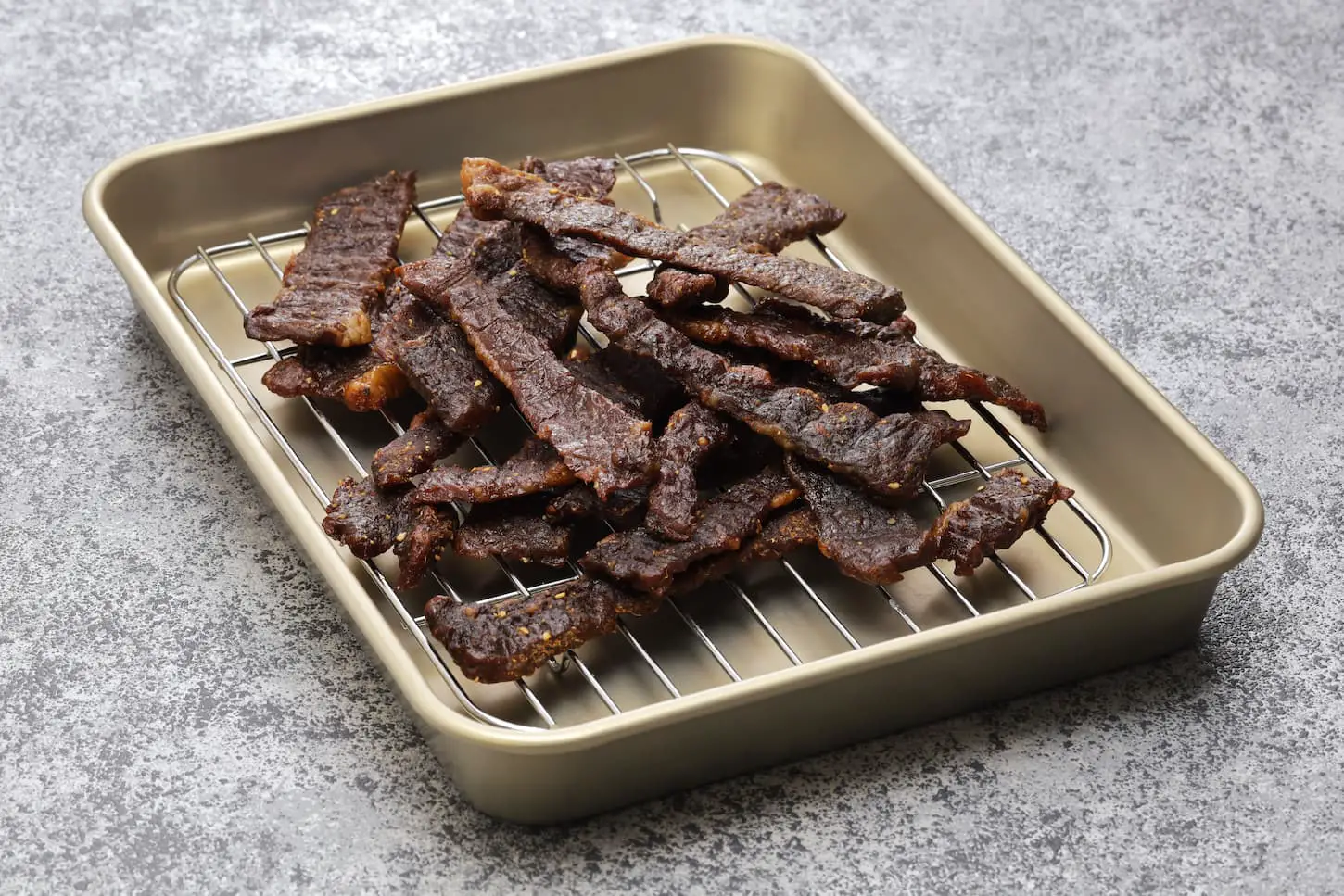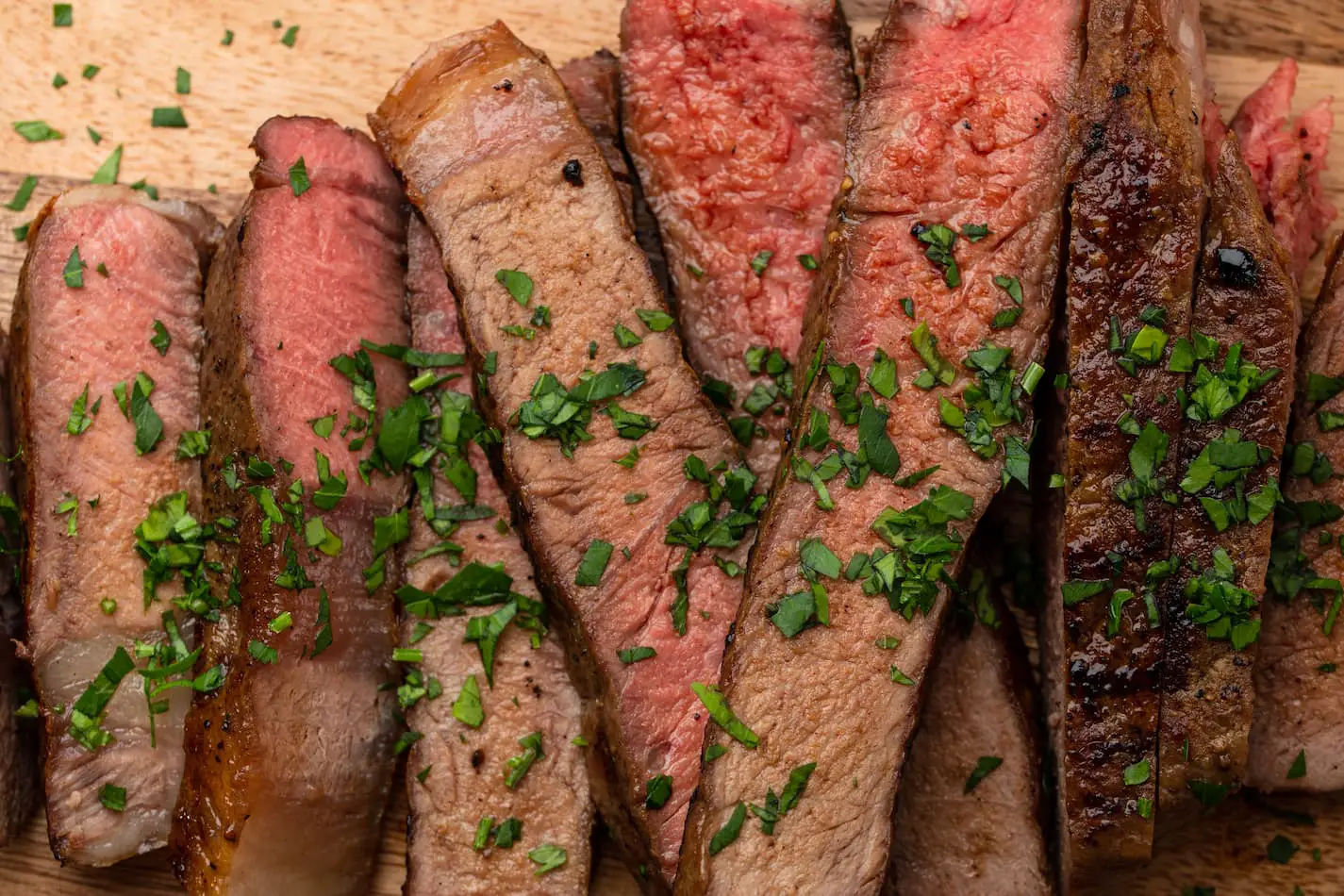I love using my freeze dryer to store fresh foods. And jerky is an amazing and delicious food that I enjoy any time (but particularly while camping). Which made me wonder… can you make jerky in a freeze dryer?
Jerky can be made in a freeze dryer but it won’t have the same texture as traditionally made jerky. However, freeze-dried jerky is far more versatile as it can be rehydrated or eaten as-is and stores well. It is also possible to freeze-dry already made jerky, though success will depend on the type of jerky and its ingredients.
Keep reading to find out more about making jerky in a freeze dryer – and what to expect about texture and expected shelf life!

Can You Make Jerky in a Freeze Dryer?
You can make a kind of jerky in a freeze-dryer, yes. It won’t be the traditional kind of jerky you’re probably thinking of, though.
For freeze-drying anything, including meats or attempts at freeze-dried jerky, I recommend Harvest Right freeze dryers (click here to check their site for sales). But before you get sticker shock (and think that they’re too expensive), read my article about why freeze dryers are expensive – and if they’re worth it.
Can you make traditional, stiff, chewy, tough jerky in a freeze dryer from raw meat? Sadly, no.
Traditional jerky requires low heat (and lots of salt) to cure it and produce its signature texture. It’s not cooked-cooked like a roast would be – but it is cooked and cured and safe to eat. Traditionally made jerky, stored properly, can last years. I’ve known of people who report no issues with 10-year-old jerky!
To make traditional jerky, you’re going to need low heat and a dehydrating process. For that, you’ll want to use your oven – or better yet, a dedicated dehydrator, like my favorite dehydrator here (click here to check the current price on Amazon).
However, you can make a different kind of jerky in your freeze-dryer. It’ll just be a much different kind of jerky than you’re probably currently used to. And it’ll still last years – depending on the meat cut, fat content, and storage conditions.
When you freeze dry already-cooked meat cuts, you end up with a new sort of jerky that can be delicious whether it’s rehydrated or eaten as-is.
If you’re eating freeze-dried meats or jerkies, remember to drink a lot of water. You’ll have to. Otherwise, your insides will get all sorts of upset with you. Trust me on this. 🙂
So freeze-dried jerky does give you some added flexibility over traditional jerky because traditional jerky doesn’t rehydrate at all.
However, freeze-dried meat has a totally different texture than regular jerky. Freeze-dried meat is crunchy and turns to powder easily. If it’s too crunchy or powdery for your tastes, it does generally reconstitute well. Just add some water and give it time to rehydrate.
How to Make Jerky in a Freeze Dryer
Freeze-dried jerky is very much a real thing – and it’s pretty easy to do. Just remember that it’ll be crunchier and much drier than traditionally-made jerky.
I’ve talked to other freeze-drying fans who purposely cook too much meat. Then, they slice it up thin and freeze dry it. These folks report that the meats have freeze-dried well and have a jerky-like quality if eaten in their freeze-dried state.
To make freeze-dried jerky, follow these general steps. These steps can be adapted for almost every cooking method, flavoring preference, and cut of meat.
- Flavor your meat.
- Cook your meat, being aware of any fats added or involved.
- Cool your meat and remove excess grease, fats, or oils.
- Cut the meat into small strips, bites, or morsels.
- Freeze dry the meat until all moisture is gone.
- Store appropriately in mylar bags with oxygen absorbers.
When you’re ready to eat your freeze-dried jerky, it’s great to eat dry or rehydrated – alone or part of a meal. If it’s not thoroughly rehydrated, there may still be some crunchiness to it, though.

Personally, I like to make freeze-dried chicken jerky. That way, on busy nights I have some quick options for making dinner. I generally opt to rehydrate it in a soup or chili because my kids aren’t big fans of jerky. But we could totally eat it right out of the mylar bag if we had to.
Can You Freeze Dry Store-Bought Jerky?
While I’ve never tried to freeze-dry store-bought jerky, there are plenty of people who have tried it – and I read up on their results in a popular freeze-drying forum. These people report varying levels of success, depending on the brand, fat content, and water content of the jerky in question.
Most people who have tried freeze-dried store-bought jerky report that it doesn’t do much to the jerky itself except make it a little bit harder and less pliable. Some noticed a slight decrease in the water content of the jerky. Some noticed no change at all.
In most cases, though, the people who experimented with freeze-drying store-bought jerky said they expected to see a slight increase in shelf-life expectancy.
All in all, the results from my research reinforced my opinion that freeze-drying store-bought jerky is a lot of extra work for not much payoff. Unless you’re going on a trip where every drop of weight counts. Then it might be totally worth it to freeze dry some jerky.
Can You Freeze Dry Homemade Jerky?
Homemade jerky may freeze-dry better than store-bought jerky, depending on how well you dehydrated it in the first place.
If you dehydrated your jerky to the point of it being brittle and bone dry, freeze-drying it probably won’t help. On the other hand, if you prefer your homemade jerky to still be somewhat tender (and therefore not fully turned to jerky), it might freeze-dry better.
My research shows that most people who’ve tried freeze-drying homemade jerky found it to be a lot of work for very few results. Therefore, I’m going to say it’s probably not worth the effort unless you’re going backpacking and trying to watch your bag’s weight.
I wrote more about this topic, so check it out in this article: Can You Make Jerky In a Freeze Dryer?
How Long Does Freeze-Dried Jerky Last?
Freeze-dried meats and jerkies may last up to 25 years or longer, depending on food content and storage practices. Fattier pieces of meat or jerky that’s been exposed to too much water will go rancid faster than will the leanest cuts that are stored at a cool, dry temperature.
We haven’t had our freeze dryer for 25 years yet – but we have had it for a few years. And we’ve been freeze-drying and using meat that easily reconstitutes and tastes good even after several years. The longest test we’ve had so far is 3 years – and that chicken was just fine.
I’ll try to do a longer test one of these days, but since we actively eat from our food storage, it’s hard to get a perfect gauge on how long the food would last!
Between my research and freeze-drying forums, though, people have reported meat as old as 5 years being still completely safe to eat. I’m sure we’ll see even longer-stored meats and jerky being reported as safe to eat as time goes on.
Want to know how long regular jerky lasts? Read this article I wrote next: How Long Does Jerky Last? How to Make It Last Longer.
Tips for Making and Storing Freeze-Dried Jerky
Ready to make and store your own freeze-dried jerky? Here are some tips that I’ve learned – either from my own experience or from my research.
Tips for making freeze-dried jerky:
- When you’re freeze drying, remember that fats don’t freeze-dry well. Rather, they retain water – and both the fat and water will cause your food to spoil.
- If you’re turning leftover steaks, ribs, pork chops, chicken, or other meats into jerky, a word of caution. Remove as much of the fat as possible. Fat doesn’t freeze-dry well and can shorten the shelf life of the end product.
- Seriously – remove the fat. Because otherwise, you’re doing a whole lot of work for a freeze-dried meal that’s got to be eaten ASAP so it doesn’t go rancid.
- Once you’re done cooking the meat, put it onto a baking pan on a cooling rack over paper towels – where any excess fat or grease can drip off. You may also want to cut off or remove any visible strips of fat that didn’t liquefy during the baking process.
Tips for storing freeze-dried meats and jerky:
- Rehydrate your freeze-dried meats in a humid setting. You may want to rehydrate it on top of a rack in a roasting pan inside your oven – and just add water to the bottom of it. Give it plenty of time to rehydrate or you’ll have crunchy bits.
- If you’re in a rush to rehydrate your jerky, plan on adding it to a soup. or chili. go ahead and break up some of the bigger pieces of meat. It’ll turn some of the meat to powder, but it’ll still taste good.
- If your freeze-dried jerky’s become powder, it’s great as a hidden source of protein in a soup, stew, or other meal. I’ve even added it to mashed potatoes – it tasted like I’d added some bouillon was all.
Making jerky with freeze-drying is a lot of fun – and it opens up a lot of food storage potential. And whether you choose to eat the freeze-dried meat as jerky or rehydrate it as part of your meal, it’s nice to have options. So go out there and enjoy your freeze-drying experiments and meals!
Related Questions
Is a dehydrator the same as a freeze-dryer? No, they are two different devices and use opposing processes to remove water from foods. A dehydrator removes water by using low heat (usually up to about 200 degrees Fahrenheit) to slowly dry and cook food. A freeze dryer freezes food and then places it under a vacuum to instantly remove water by vaporizing it – and without cooking the food. Read more about the differences between freeze dryers and dehydrators here.
How much does a freeze dryer cost? A home freeze dryer may cost anywhere from $1995 to $3500 or more, depending on size and features. Commercial freeze dryers cost anywhere from $5,000-$10,000 or more, depending on features. Accessories and storage materials are not included in these prices. Read my article about freeze-dryer costs here.
Can you freeze dry meat? Meat can be freeze-dried. How well it freeze-dries will depend on fat and water content. Fattier cuts of meat will not freeze-dry as thoroughly and will go rancid faster than leaner cuts will. Therefore, freeze-drying meats work better with leaner cuts. Using a paper towel before and after freeze-drying to wipe up/off excess fat is a common practice to extend shelf life capabilities. Read my article about freeze-drying jerky here, or freeze-drying aged beef here.